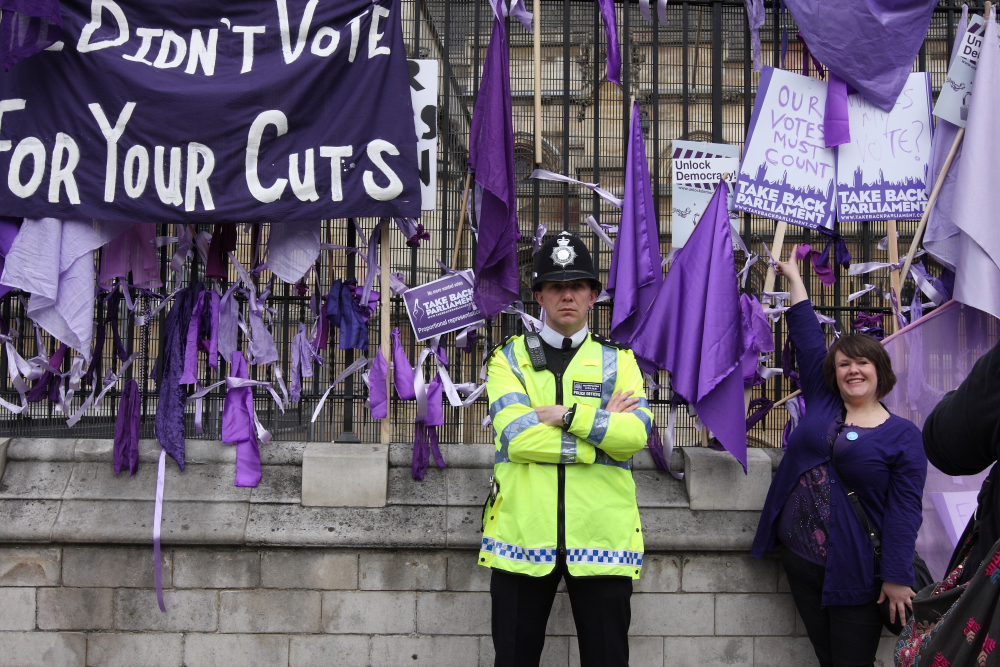The crisis in the Dutch Socialist Party (SP) has reached a new low after the Party Council ratified the leadership’s decision – taken in December – to cut all ties with ROOD, the SP’s now former youth organisation. According to the party leadership, the youth wing suffered a hostile takeover by ‘attic room communists’ who were plotting a violent civil war. The media were eager to embrace these wild accusations that were especially designed to connect to far-right conspiracy theories. The reality is very different however. The split between the SP and ROOD is a symptom of the deep crisis that has been developing in the party over the past years.
The SP, originally a Maoist party, made quick gains in the late 1990s and early 2000s as an anti-neoliberal force and as a left alternative to the GreenLeft (GL) and social democrats (PvdA) that had supported both neoliberalisation and NATO’s bombardments on Yugoslavia. At their high point in 2006, the party had over 50.000 members and won 16,6% of the vote in the parliamentary elections. The party’s hope of entering a coalition government were shattered as the neoliberal parties had no reason and no inclination to work with them.
The ‘trauma’ of 2006
As they were the only party outside of the broad neoliberal consensus in parliament, the outcome was predictable. The SP-leadership did not foresee it, however, and thus could not prepare their membership or their constituents for it. After the ‘trauma’ of 2006, the party entered a long period of stagnation. The movements against neoliberal globalisation and the war against Iraq receded while the SP tried to moderate its profile and to prove itself as a dependable partner in a future coalition government.
This meant that the party emphasised the reasonableness of their views in order to persuade other parties and their constituents that a government coalition with the socialists was a realistic possibility. The result was that the SP did next to nothing to distinguish themselves from other parties, even though they were still the only party on the left that was consistently opposed to neoliberalism.
The campaigns the SP organised focussed more and more on economic single issues, such as their campaign for a National Health Fund. These campaigns were organised by the SP alone, so they could be controlled from above, and they only served to generate publicity for the SP and their ideas. The only way the leadership could conceive of actually winning any of these demands was through government and so everything was subordinated to election results.
The result was that these proposals started to sound more and more utopian, as there was no realistic strategy to win. At the same time the focus on single issues meant that they didn’t figure in a broader leftist or socialist world view. A political critique of capitalism or even neoliberalism was at best only implicitly present in the SP’s politics and a positive vision of what socialism should be was altogether lacking.
The lack of a persuasive political narrative and political strategy was further emphasized by the fact that the party mostly ignored important political issues such as the struggle against oppression and climate change – Jan Marijnissen, the party’s historical leader, who led the party until after the 2006 coalition negotiations, even denies that climate change is caused by human behavior.
Social-democratised Maoism
An analysis of their stagnation was lacking however, which is in large part due to their political tradition, which does not view internal debate or even making political analyses as useful or legitimate. The SP did ‘de-Mao-ise’ from the late 1970’s onwards, but it retained some traits of Maoism that fit well with their reformism. One of them is a very monolithic and undemocratic internal regime. The SP’s highest decision making body is not their Party Congress, but their bimonthly Party Council, which consists of the chairpersons of local branches who lack a specific mandate. Internal fractions are strictly forbidden and none of the SP’s media even provides space for discussion or debate.
A second leftover from Maoism is an essentialist understanding of class, which means that political analysis is useless at best, because all knowledge comes straight from ‘the people’ and self criticism can only mean going into neighborhoods, talking to people and accepting their opinions. As the SP and the rest of the established left is hardly even present in ideological debates and doesn’t provide political answers from a left perspective, it shouldn’t be a surprise that the opinions they encounter are more and more influenced by the right.
The reasons given for the party’s bad results were threefold: the lack of charisma of the party leaders after Marijnissen; the ever insufficient discipline and work-ethic from the membership; and an insufficient focus on bread and butter-issues as opposed to ‘divisive’ political issues. Indeed, the SP even complained that they lost elections because ‘their issues’ (healthcare especially) weren’t on the political agenda, which is another way of saying they were not able to provide socialist answers for the political questions that mattered.
When Covid finally put ‘their’ issues in the spotlight, the SP decided they had to show their responsibility by fully supporting the government’s disastrous policy. For months the party kept quiet about underpaid and overworked health care workers who weren’t given PPE while the government was gambling with people’s lives with their ‘herd immunity’-strategy which had no scientific basis and was dictated by their commitment to corporate profits.
From stagnation to decline
When Lilian Marijnissen, Jan’s daughter, became party leader in 2017 hopes were high that her new energy and charisma, combined with a silencing of internal critics that supposedly undermined the party’s performance and an emphasis on a social-chauvinist rhetoric would yield results. What happened, perhaps unsurprisingly, was the exact opposite.
Marijnissen’s political vocabulary tried to appeal to the lowest common denominator, with abstract calls for ‘justice’ and naive indignation at the right’s antisocial policies taking centre stage. At the same time the party ramped up it’s nationalism, even sacrificing their previous opposition to neoliberalism in the process. For example, the SP opposed equal unemployment benefits for migrant workers. The party also supported the racist burqa-ban and took harsh actions against party representatives that dared to speak out against the far right.
For young people on the left, that become radicalised mostly around feminist ideas, antiracism and the climate movement and are looking for big ideas in order to better understand the tremendous problems the world and their generation faces, there isn’t much the SP has on offer.
On the other end of the spectrum, rather than winning back far right voters, the SP’s political line functioned as a bridge to the far right. Of the people that voted for the neofascist Forum for Democracy (FvD) in the national elections in March, no less than 8 percent had been SP-voters four years previous. They were the biggest group after those coming from Geert Wilders’ racist PVV, those that already voted FvD and previous non-voters. Only 5 percent came from the liberal-conservative VVD and 4 percent came from the conservative Christian-democrats (CDA).
In other words, relatively the SP in opposition lost almost as much to the neofascist right as the two most right wing parties in government combined. Other left parties and even progressive liberal parties only lost very few voters to the far right.
Electorally, the SP did badly, losing all their seats in the European Parliament in 2019 and falling back to just below 6 percent of the vote, or 9 seats in the parliamentary elections in March of this year – the lowest figure since 2002. The repressive internal regime; the lack of commitment to combatting racism, climate change, and the far right; and the abysmal results led many experienced members to leave the SP over the last decade. Despite a massive membership-campaign in 2019 and 2020 that reduced some of the damage, the party’s membership now sits just above 30.000, down roughly 40 percent since 2006.
The leadership has shown no signs of changing its course however. In spite of clear proof of the opposite, they remain convinced that their chauvinism, cheap moral indignation, and ever more modest demands will finally pay off, when all critical members are gone and those remaining will no longer be demoralised by their ‘negativity’.
Split
The problems of the SP’s political line are most clearly felt in the big cities and among the youth, which is why branches in urban area’s and ROOD were the parts of the SP that were most critical of the leadership. The problems within ROOD started in 2019. Arno van Veen had already been in the ROOD-leadership and was being prepared to be the youth wing’s next chairperson in 2019, when he spoke out at a Party Council meeting for solidarity with refugees, implicitly criticising the SP’s support for the murderous anti-refugee agreements between the EU and Turkey and Libya.
The party leadership immediately dropped all support for him. Arno was told by the screening commission that they rejected his candidature as he ‘did not know his place’. Arno still ran for chairperson and was elected, despite the party leadership going out of their way to mobilise inactive loyalists to vote against him.
This gave more space for discussion within ROOD, which played into the hands of a group called the Communist Platform (CP), that was already clandestinely active within ROOD. As the only organised group within the youth wing, they were quickly able to win over the majority of ROOD for their proposals that focussed mostly on democratisation of the party.
Part of their attraction was that they did try to provide socialist ideas and organised discussions around them. A year after Arno became chairperson, CP pushed forward their own candidates. The SP leadership then sounded the alarm and expelled the six CP members they could identify, including Olaf Kemerink who ran for chairperson. ROOD refused to yield to pressure from the SP-leadership and allowed the CP-candidates to stand. When CP-member Olaf Kemerink was elected as the new chairperson, the SP immediately cut ROOD’s funding, cut access to their website and publicly broke with their youth movement.
Show trial
Many critical SP members were appalled by the leadership’s conduct, not in the least because of the bizarre smears the leadership used to cause a scandal in the far right press. They were not able to mobilize a majority however. During the Party Congress in December, over a third of the attendees voted against the split.
The leadership almost immediately started preparing the founding of a new youth organisation, but in an attempt to appease parts of their membership, they issued an inquiry by a group of prominent members, led by Nine Kooiman, a former MP, who is now vice chairperson of the police union. As is to be expected, the commission’s conclusions are in line with the Party leadership’s views and their reasoning is downright laughable.
The report concluded that the split was irreparable. The leadership had made a mistake by not intervening in ROOD quickly enough. The biggest problem, however, was structural. The fact that ROOD was even allowed to make their own decisions was a design-flaw. ‘In retrospect, the decision, made at the time, to place the youth organisation completely outside of the party’, i.e. to allow it to make its own decisions, ‘has been an unfortunate one’, the commission concluded. The new youth organisation should therefore be organised ‘within’ the party. In order to prevent the youth from reading dangerous literature, their education will have to be the responsibility of the SP’s central leadership.
However, the commission writes unironically, the new youth organisation will also have to be ‘autonomous’. While they won’t be able to make any decisions or take political positions, they will receive the right to choose which points from the party’s programme they will build their campaigns around. The new chairperson will also gain a seat in the national leadership, but because the leadership acts as a bloc within the party, in practice this only means that the national leadership will gain direct control over them. At the Party Council in June 87% of the members agreed with the commission and sanctioned the expulsion of ROOD.
No quick death
The break with their youth underscores the SP-leadership is willing to go to extreme lengths in order to insulate themselves from criticism. The SP had never been good at educating cadre that’s able to make analyses and to think critically and the present leadership is certainly proof of that. But by cutting themselves off from young people who – despite everything – have tried to turn the SP into something better, they now also cut themselves off from their last hope of regeneration as a socialist party. Young people that remain in the party will be driven by political ambition and will be exclusively judged according to their loyalty.
That doesn’t mean that the SP’s role is completely played out. The party will probably play a role in parliament and in elections for years, perhaps even decades to come. They will however have more and more trouble differentiating themselves from the traditional social-democrats, especially as the memory of the social-democrats in office fades. When it comes to cheap leftish demagoguery, social-democrats are after all much more experienced than the SP.
And there is also BIJ1, a new antiracist party that, though it is focussed primarily on parliamentary work, not on extra-parliamentary struggles, is doing an admirable job at taking a principled left stand on many issues that the established left has remained silent on, such as the government’s Covid policy, racism, and the rise of the far right. Though their social-economic profile isn’t as strong as the SP’s once was, for people craving a principled left, BIJ1 is far more attractive.
Where next for ROOD?
The future of ROOD is more difficult to predict. ROOD, and especially CP, have been very much focussed on the SP itself, they haven’t taken up their place in the social movements and other struggles and only rarely take up positions in current affairs. Some remaining left SP-members are now trying to get elected in the national leadership under the banner of the ‘Marxist Forum’, which has not been expelled from the SP, but might well follow. The chances of their attempt succeeding – even if they’re not expelled before November, when the elections take place – are slim if not nil.
ROOD seems to want to stay in the SP as much as they can, as more critical branches will still tolerate the youth and most ROOD-members have not been individually expelled from the SP. The focus on trying to change the SP from within, even now that it’s hardly even a theoretical possibility anymore, can only lead to the disintegration of ROOD as it will stall their development as an independent organisation with their own standpoints and their own political praxis. This is exactly what the SP-leadership is gambling on.
The continued orientation on the SP is pushed by the Communist Platform. CP is a Kautskian organisation that believes the only way to make any progress is to turn the SP into a ‘Party-Movement’ that will make all other parties and movements obsolete. This they see as a necessary prerequisite for basically any political struggle. Existing social movements they denounce as small and insignificant. But their rejection of building social movements is based on politics as well.
Party like it’s 1891
CP, for example, believes climate change can easily be stopped by switching to nuclear power and especially thorium. They therefore support the nuclear lobby in favour of building the climate movement. Completely ignoring the development of the women’s movement over the past century since universal suffrage was won, the CP rejects feminism as a bourgeois phenomenon, insisting that ‘the women’s question’ (as they call it) can only be solved through an independent proletarian struggle for women’s liberation, which in turn requires some mythical Party-Movement. Whether by coincidence or by design, the CP’s standpoints in regard to current struggles always come down to a ‘radical’ renunciation of ‘class collaborationist’ social movements and struggles with a view to ‘real’ struggles in the distant future.
The CP itself will sooner or later have to revise their dogmatism when their last hopes to reform the SP are finally shattered. Then it will either have to join the struggles that they now ridicule or they will have to proclaim themselves as (the nucleus of) the new Party-Movement so as to allow themselves to continue to combine verbal radicalism with practical political passivity.
The fact that CP is the only organised force within ROOD and therefore influential does not change the fact that many ROOD-members have chosen to stand firm against the SP-leadership precisely because they were fed up with the SP’s isolation and rejection of social movements and are eager to finally put their weight behind them. It is possible that they will try to give ROOD a political orientation focussed on working with others to build the movements and the struggles that are now being built and fought. This is far from guaranteed, however, and it is perhaps more likely that many of these members will simply vote with their feet.



